牛津unit2let's play sports复习
牛津译林版七年级英语上册Unit 2 Let's play sports!知识点复习教案
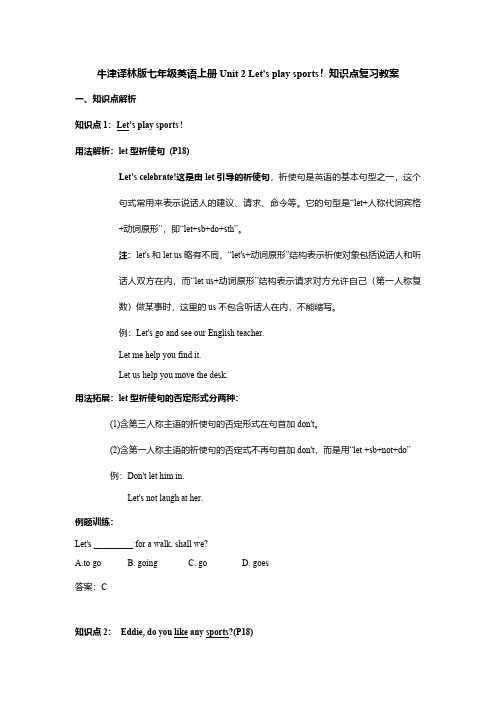
牛津译林版七年级英语上册Unit 2 Let's play sports!知识点复习教案一、知识点解析知识点1:Let’s play sports!用法解析:let型祈使句(P18)Let's celebrate!这是由let引导的祈使句,祈使句是英语的基本句型之一,这个句式常用来表示说话人的建议、请求、命令等。
它的句型是“let+人称代词宾格+动词原形”,即“let+sb+do+sth”。
注:let's和let us略有不同,“let's+动词原形”结构表示祈使对象包括说话人和听话人双方在内,而“let us+动词原形”结构表示请求对方允许自己(第一人称复数)做某事时,这里的us不包含听话人在内,不能缩写。
例:Let's go and see our English teacher.Let me help you find it.Let us help you move the desk.用法拓展:let型祈使句的否定形式分两种:(1)含第三人称主语的祈使句的否定形式在句首加don't。
(2)含第一人称主语的祈使句的否定式不再句首加don't,而是用“let +sb+not+do”例:Don't let him in.Let's not laugh at her.例题训练:Let's _________ for a walk, shall we?A.to goB. goingC. goD. goes答案:C知识点2:Eddie, do you like any sports?(P18)用法解析:(1) like vt. 反义词是dislike 不喜欢like sth./sb. 喜欢某物/某人(表泛指用复数)I like dogs.(泛指)He doesn’t like his teacher.like doing sth.喜欢做某事(表示人的兴趣、爱好及经常性的活动)like to do sth.喜欢做某事(表示偶然的、一次性的活动,类似want to do sth.)I like playing the violin, but today I like to play football. 我喜欢拉小提琴(经常的,爱好),但是今天我想踢足球。
译林版牛津英语 7A Unit 2 Let's play sports单词,重点词组和句型默写稿

7A Unit 2单词,重点词组和句型默写稿二、重点词组和句型(P18-19)1.步行去某地(2种)_____________________________________________________________________ 2.一天许多次_____________________________________________________________________ 3.对次数提问:_______________________________________________________ 对频率提问:____________________________________________________4.你最喜爱的体育运动是什么?(2种)_____________________________________________________________________ 5.你怎么样?(2种)_____________________________________________________________________ (P20)6.我最喜爱的……_____________________________________________________________________ 7.他是黄河足球俱乐部的成员。
(2种)_____________________________________________________________________ 8.看起来强壮_____________________________________________________________________ 9.足球踢得好_____________________________________________________________________ 10.在他的空闲时间里_____________________________________________________________________ 11.喜爱听音乐_____________________________________________________________________ 12.使他开心_____________________________________________________________________ 13.想要做某事(2种)_____________________________________________________________________ 14.我希望他的梦想成真。
牛津英语7A Unit 2Let's play sports 重点用法梳理
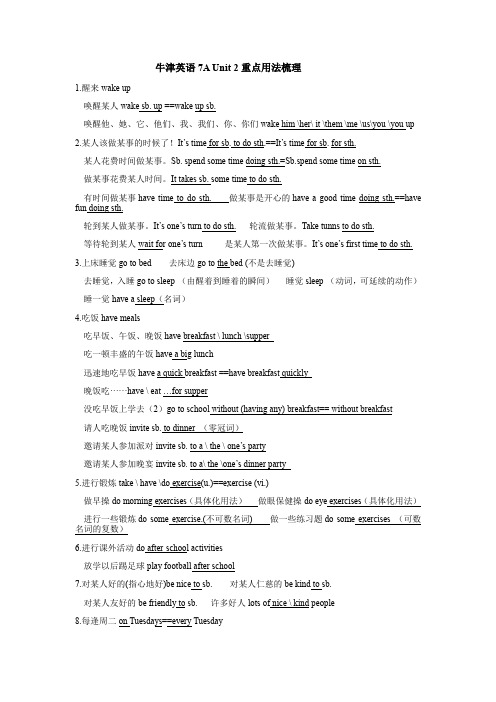
牛津英语7A Unit 2重点用法梳理1.醒来wake up唤醒某人wake sb. up ==wake up sb.唤醒他、她、它、他们、我、我们、你、你们wake him \her\ it \them \me \us\you \you up 2.某人该做某事的时候了!It’s time for sb. to do sth.==It’s time for sb. for sth.某人花费时间做某事。
Sb. spend some time doing sth.=Sb.spend some time on sth.做某事花费某人时间。
It takes sb. some time to do sth.有时间做某事have time to do sth. 做某事是开心的have a good time doing sth.==have fun doing sth.轮到某人做某事。
It’s one’s turn to do sth. 轮流做某事。
Take tunns to do sth.等待轮到某人wait fo r one’s turn 是某人第一次做某事。
It’s one’s first time to do sth.3.上床睡觉go to bed 去床边go to the bed (不是去睡觉)去睡觉,入睡go to sleep (由醒着到睡着的瞬间)睡觉sleep (动词,可延续的动作)睡一觉have a sleep(名词)4.吃饭have meals吃早饭、午饭、晚饭have breakfast \ lunch \supper吃一顿丰盛的午饭have a big lunch迅速地吃早饭have a quick breakfast ==have breakfast quickly晚饭吃······have \ eat …for supper没吃早饭上学去(2)go to school without (having any) breakfast== without breakfast请人吃晚饭invite sb. to dinner (零冠词)邀请某人参加派对invite sb. to a \ the \ one’s party邀请某人参加晚宴invite sb. to a\ the \one’s dinner party5.进行锻炼take \ have \do exercise(u.)==exercise (vi.)做早操do morning exercises(具体化用法)做眼保健操do eye exercises(具体化用法)进行一些锻炼do some exercise.(不可数名词) 做一些练习题do some exercises (可数名词的复数)6.进行课外活动do after-school activities放学以后踢足球play football after school7.对某人好的(指心地好)be nice to sb. 对某人仁慈的be kind to sb.对某人友好的be friendly to sb. 许多好人lots of nice \ kind people8.每逢周二on Tuesdays==every Tuesday在周二on Tuesday 在周二上午、下午、晚上on Tuesday morning \ afternoon \ evening 每周二的上午on Tuesday mornings ==every Tuesday morning9.她是一个很棒的游泳者。
牛津译林版英语7A Unit2Let's play sports 单元知识解析
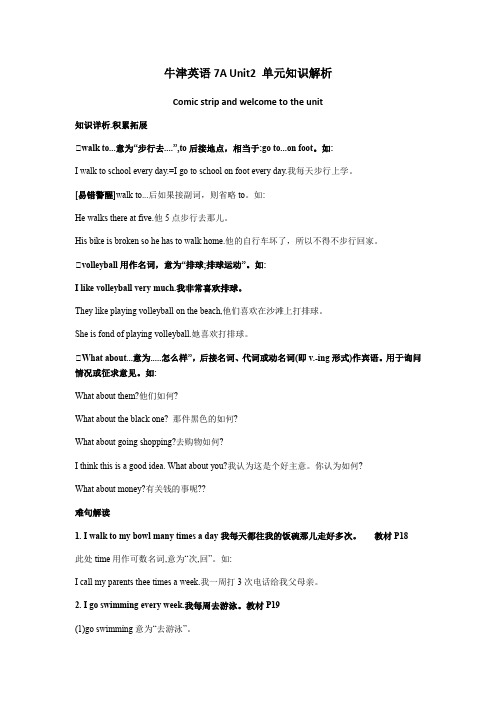
牛津英语7A Unit2 单元知识解析Comic strip and welcome to the unit知识详析.积累拓展➊walk to...意为“步行去....”,to后接地点,相当于:go to...on foot。
如:I walk to school every day.=I go to school on foot every day.我每天步行上学。
[易错警醒]walk to...后如果接副词,则省略to。
如:He walks there at five.他5点步行去那儿。
His bike is broken so he has to walk home.他的自行车坏了,所以不得不步行回家。
❷volleyball用作名词,意为“排球;排球运动”。
如:I like volleyball very much.我非常喜欢排球。
They like playing volleyball on the beach,他们喜欢在沙滩上打排球。
She is fond of playing volleyball.她喜欢打排球。
❸What about...意为.....怎么样”,后接名词、代词或动名词(即v.-ing形式)作宾语。
用于询问情况或征求意见。
如:What about them?他们如何?What about the black one? 那件黑色的如何?What about going shopping?去购物如何?I think this is a good idea. What about you?我认为这是个好主意。
你认为如何?What about money?有关钱的事呢??难句解读1. I walk to my bowl many times a day我每天都往我的饭碗那儿走好多次。
教材P18此处time用作可数名词,意为“次,回”。
如:I call my parents thee times a week.我一周打3次电话给我父母亲。
牛津译林初中七年级英语上册Unit 2 Let's play sports》Study skills
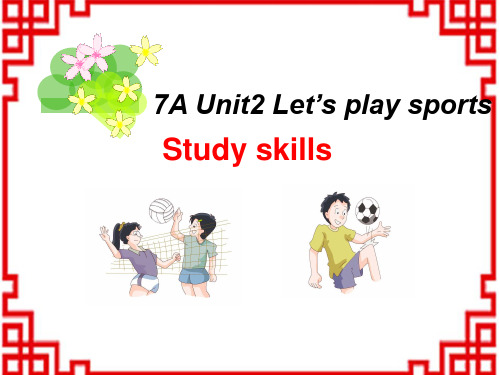
U but cup duck run sun
/ʌ/
Would you please help the words find their homes?
clock club fun get happy listen bad often swim well dad pick left study fox
[ 'pensəl ]
pencil
hey. It’s not easy to find a pen. You can sit here and use mine.
I
[ i]
[ 'lisən ]
film
listen
bill
[ swim ]
Unluckily, the cup was broken (坏了) and the map was torn (撕碎), but the dog ran
away.
[ʌ]
[ klʌb ]
club
[ fʌn ]
fun
mum gun just luck
Unluckily, the cup is broken (坏了) and the map is torn (撕碎), but the dog runs
risk
swim
silk
At that moment, a dog jumped out of the box and ran to the man. It could not stop! How dangerous!
X
[ɔ ]
[ 'dɔktə ]
doctor
[ 'ɔfən ]
often
hot job top rock
I
七年级英语上册Unit2Let’splaysports重要知识点新版牛津版

Unit2 重要知识点1.do /play sports做运动have a sports meeting 举行运动会sports shoes 运动鞋2.go walking=go for a walkhave/take a walk去散步go out for a walk出去散步take sb for a walk带某人去散步take one’s dog for a walk=walk one’s dog遛狗3.go to spl on foot=walk to spl.步行去某地4.real adj.真实的,真的➡ really adv.的确,确实He ______(real) likes Jim,because Jim is a______(real)friend.形容词:be后名前,修饰名词副词:修饰形容词/动词5.walk to my bowl走向我的碗➡walk to spl 走向某地6.time 不可数名词:时间some time一段时间 sometime某时可数名词:次数( / 倍)some times 几次 sometimes偶尔,有时many times a/every day一天多次 one time➡once two times➡twice ≥3数词+times I brush my teeth twice a day.(画线提问)➡How often do you brush teeth?I brush my teeth two times a day.(画线提问)➡How many times do you brush teeth a day?7.What/How about (doing) sth? (做)某事怎么样/如何?8.My favourite football player.①favourite = like...best②football player足球运动员★swimme r游泳运动员9.a member of.... ...的一员 He is a member of the Football Club.= be in/on.... = He is in the Football Club.= join.... = He joins the Football Club.10.look strong ➡系动词+形容词系动词:be动词,感官动词5个(look,smell,sound,taste,feel),keep11.play football very well.足球踢得非常好。
Unit 2【刷题型】(题型组合提升练)-2024-2025学年七年级英语上册单元模块满分必刷题(牛
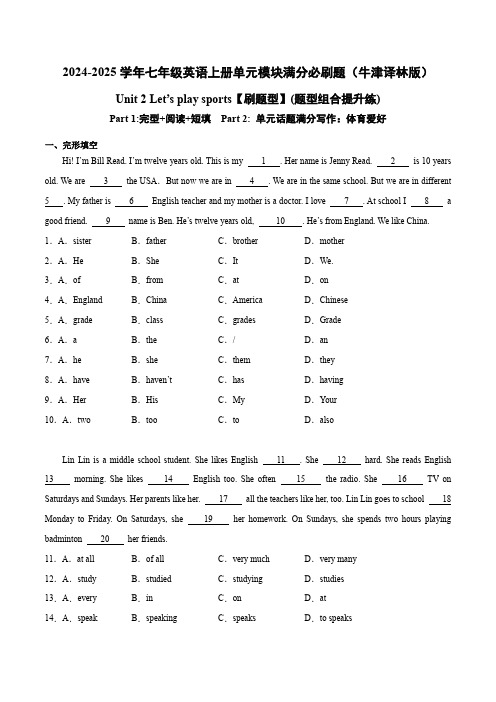
2024-2025学年七年级英语上册单元模块满分必刷题(牛津译林版)Unit 2 Let’s play sports【刷题型】(题型组合提升练)Part 1:完型+阅读+短填Part 2: 单元话题满分写作:体育爱好一、完形填空good friend. 9 name is Ben. He’s twelve years old, 10 . He’s from England. We like China. 1.A.sister B.father C.brother D.mother2.A.He B.She C.It D.We.3.A.of B.from C.at D.on4.A.England B.China C.America D.Chinese5.A.grade B.class C.grades D.Grade6.A.a B.the C./D.an7.A.he B.she C.them D.they8.A.have B.haven’t C.has D.having9.A.Her B.His C.My D.Your10.A.two B.too C.to D.alsoLin Lin is a middle school student. She likes English 11 . She 12 hard. She reads English 13 morning. She likes 14 English too. She often 15 the radio. She 16 TV on Saturdays and Sundays. Her parents like her. 17 all the teachers like her, too. Lin Lin goes to school 18 Monday to Friday. On Saturdays, she 19 her homework. On Sundays, she spends two hours playing badminton 20 her friends.11.A.at all B.of all C.very much D.very many12.A.study B.studied C.studying D.studies13.A.every B.in C.on D.at14.A.speak B.speaking C.speaks D.to speaks15.A.hears B.hear C.listen to D.listens to16.A.sees B.watches C.looks at D.looks17.A.And B.But C.So D.Or18.A.at B.from C.on D.in19.A.does B.do C.doing D.to do20.A.with B.and C.or D.butBruno is a young man of twenty. He’s very 21 and likes sports and he likes football very 22 . He always plays football or 23 football matches if he’s 24 . One Saturday afternoon there was a football match. The young man was happy because he got a 25 . After lunch he went to the stadium (体育场). On his way 26 , something was wrong with his car. He had to stop to mend it. When he drove it again, he looked at his 27 and found there was only ten minutes left. He was afraid to be late for the match and drove fast. At the turning, the lights were red but he didn’t stop. The 28 stopped him and asked, “Why didn’t you wait for a few 29 ? Didn’t you see the red lights?” “Yes, I did, sir.” said Bruno, “ 30 I didn’t see you.”21.A.short B.strong C.thin D.ill22.A.well B.good C.much D.many23.A.sees B.watches C.looks at D.reads24.A.free B.busy C.sad D.happily25.A.book B.map C.ball D.ticket26.A.here B.home C.school D.there27.A.clock B.hand C.watch D.foot28.A.doctor B.policeman C.teacher D.driver29.A.weeks B.days C.hours D.minutes30.A.And B.So C.Because D.But二、阅读单选This term we have a new teacher of English. His name is Mr Brown. He comes from Australia, but now he lives in a tall building in Wuxi. He is not very tall and he is thin. He has a round (圆的) face and small blue eyes. He has dark brown hair. He wears glasses and they make him look clever.Mr Brown works very hard. In class, he has many good ideas to make the class very interesting. We all like his class. After class, he always encourages us to speak more English. Sometimes, he plays games with us. He is very strong and he can play basketball and football very well. Sometimes, he plays table tennis with us, but he doesn’t play it very well.Mr Brown loves living in China very much. He enjoys lots of things in China. He really loves eating Chinese food. He loves traveling in China, too.31.What does Mr Brown do? Mr Brown is ________.A.a doctor B.a teacher C.a farmer D.a worker32.We can not use ________ to describe(描述) Mr Brown.A.tall B.strong C.sporty D.hard-working(勤劳的)33.How many ball games is Mr Brown good at?A.4B.3C.2D.134.The underlined(画线的) word “encourage” means ________ in Chinese.A.阻止B.嘲笑C.逼迫D.鼓励35.Which of the following is not true(正确)?A.Mr Brown is a very good English teacher.B.Mr Brown likes playing computer games.C.Mr Brown is a very good football player.D.Mr Brown enjoys his life in China.Benny is seven years old. He studies well at school, but his teachers don’t like him, for he has poor personal habits(个人习惯). His face often looks dirty because he doesn’t like to wash his face.Benny’s uncle is a doctor. One day, he came to visit Benny. He wanted to teach Benny how important it was to keep clean. He pointed to Benny’s face and said,”Benny, I know what you ate for breakfast this morning.”“What?” Benny looked at his uncle and asked in surprise.“Let me guess. Cakes? Dumplings? Hamburgers? I think you ate eggs,” said his uncle.“ How do you know, Uncle Jack?”“ Your face told me that.”“But you are wrong, my dear uncle!” said Benny happily, “Not today. I ate them yesterday.”36.What is Benny?A.He is a middle school student.B.He is a pupil.C.He is a teacher.D.He is a doctor.37.What does the underlined word “them” refer to(所指)?A.Eggs B.Cakes C.Dumplings D.Hamburgers38.Who or what told Uncle Jack what Benny ate?A.Benny B.Benny’s face C.Benny’s parents D.Benny’s hands39.When did Benny eat eggs?A.This morning.B.Today.C.Three days ago.D.Yesterday.40.Which of the following is NOT true ?A.Benny’s uncle wanted to teach Benny a lesson one day.B.Benny’s uncle is a doctor.C.Benny washes his face and hands with water only.D.Benny does well in all his lessons at school.In a chatting room on the Internet, some children are talking about what they like to do at school.Flying Fish: I think music is my favourite. I like listening to many beautiful English songs. I need to feel relaxed after a day’s work. So I often listen to my favourite music after supper.Singing Bird: I like music, too. But I only listen to Chinese songs. I also like drawing and reading. Reading makes me clever.Jumping Tiger: I don’t like music or drawing. But I am a good basketball player. I can help our school team win. Don’t you think it’s cool?Running Football: I am not a good basketball player. But I play football well. Playing football makes me strong.I feel great when I am on the football field. I spend half an hour a day playing football.Swimming Cat: I am not like many other boys. I don’t like sports very much. I just think reading is my favourite.I can learn a lot from books. I spend an hour reading books every day.41.What does Jumping Tiger think is cool?A.Music.B.Basketball.C.Football.D.Drawing.42.Who likes reading books?A.Flying Fish.B.Singing Bird.C.Swimming Cat.D.Swimming Cat and Singing Bird. 43.How long does Running Football play football every week?A.For half an hour.B.For more than three hours.C.For seven hours.D.For one hour.44.What’s the Chinese meaning of the underlined word “relaxed”?A.劳累B.忧郁C.放松D.紧张45.Which is NOT mentioned(哪一项没有提到)?A.Sports.B.Art.C.Chinese songs.D.TV.三、短文首字母填空四、作文76.现代人生活节奏快,缺乏足够的运动,导致身体素质下降,尤其是中小学生群体,他们的身体素质令人颇为担忧。
七年级英语上册 Unit 2 Let's play sports知识点梳理(下)(新版)牛津版

7AUnit 2知识点梳理(下)复习导入重点单词散步,步行 walking 的确,确实 really网球 tennis 排球 volleyball享受…的乐趣,欣赏,喜爱 enjoy 成员 member梦想,梦 dream 希望 hope周末 weekend 队,组 team比赛,竞赛 match 偶像,英雄 hero重点短语play sports 做运动 of course 当然in one’s free time 在某人空闲的时间 go swimming 去游泳listen to music 听音乐 come true 变为现实,成为事实stay at home 待在家里 at/on weekends 在周末a lot of 许多,大量 talk about/of 谈论知识点梳理一.词汇&短语:WORDS&PHRASES1.He/She/It likes sports. 他/她/它喜欢运动。
含有行为动词的一般现在时,当句子的主语是第三人称单数时,谓语动词也用第三人称单数形式,其他情况谓语动词用动词原形。
我来自中国,她来自美国。
I come from China and she comes from America.她对孩子很有耐心,所以她能成为一位好老师。
2. He/She/It does not like sports.他/她/它不喜欢运动。
含有行为动词的一般现在时的否定句型:主语+don’t/doesn’t+ 动词原形+其他。
我根本不喜欢足球。
I don’t like soccer at all.他不生活在中国。
He doesn’t live in China.3. Do I/you/we/ they like sports?我/你(们)/我们/他们喜欢运动。
此句是含有行为动词的一般现在时的一般疑问句形式,其构成可归纳为:Do/Does+主语+动词原形+其他?当主语为第三人称单数时用does。
- 1、下载文档前请自行甄别文档内容的完整性,平台不提供额外的编辑、内容补充、找答案等附加服务。
- 2、"仅部分预览"的文档,不可在线预览部分如存在完整性等问题,可反馈申请退款(可完整预览的文档不适用该条件!)。
- 3、如文档侵犯您的权益,请联系客服反馈,我们会尽快为您处理(人工客服工作时间:9:00-18:30)。
复习:1 play/do/have sports 做运动2 play __________弹钢琴play的用法。
(1)意为“打球,打牌,下棋”等,其后直接加球类运动、牌类或棋类运动名词,名词前通常不用冠词。
They are playing football.他们正在踢足球。
We often play chess together. 我们常常一起下棋。
(2)play意为“弹、拉,演奏”,其后接乐器名词时要用定冠词the。
例如:He plays the violin very well. 他的小提琴拉得很好3 walk to(1)步行去walk to my school步行去学校=go to schol on foot步行去公园____________________=______________________步行回家_____________________=_______________________(2)向……走去walk to my bowl 走向我的碗走向我的爸爸____________________________4 lots of =a lot of 意为“许多的,大量的”=many 或much但lots of / a lot of 既可修饰可数名词复数,也可修饰不可数名词many只可修饰可数名词复数much只可修饰不可数名词。
The old man has ________________________ money. 那个老年人有许多钱。
There is _________milk in the bottle. 那个瓶子有许多奶。
There are ________________ books in our classroom. 我们教室里有许多书。
许多人____________some 意为“一些”,用法与lost of /a lot 相似,既可修饰可数名词复数,也可修饰不可数名词few(表示否定,意为“几乎没有”)与a few (意为“几个,一些”)只能修饰可数名词复数little(表示否定,意为“几乎没有”) 与a little (一点)只可修饰不可数名词。
many与few 互为反义词;much与little互为反义词。
5 many times a day 一天许多次(提问时用how often)twice a week一周两次once/ twice/ three times/ four times/…一次/两次/三次/四次/……a day/a week/a month/ a year 每一天/每一周/每个月/每年我每周游泳三次。
_______________________6 fun sport=interesting sport 有趣的运动7 after school 放学以后after class 课后8 talk about popular musictalk with sb. 和某人说话talk about/of 谈论某事他和我谈他的学校。
_________________________9 ____________________听音乐听某人说______________10 like 喜欢v. He likes playing footall with his friends.be like 像…… like adj. Daniel is my best friend,we are like brothers.______ you like blue?11 on Sunday 表示可以具体的一个星期日(偶然性的)I will play football on sunday.on Sundays 则表示每逢星期日,即每个星期日都好重复同一个动作.(经常性的)I stay at home and watch TV on Sundays .12 make friends with sb. 和某人交朋友be friends with sb.13 in my free time在我的空闲时间里in one’s free time 在某人的空闲时间里free 空闲的When I am__________(空闲的),I often read books.14 look + adj. 看起来…….sound + adj. 听起来……look strong/beautiful/prettysound great15 a member of………的成员be a member of Reading Club=join the Reading Club16 the next World Cup 下一届世界杯17 next to 紧挨着She lives next to me.18 We would like to go to Beijing zoo because the price is low.would like 意为“想要,愿意”,相当于want, 但would like 语气更委婉。
其后常加名词/代词或动词不定式。
What would you like to have for supper? 你晚饭想吃什么?I’d like some vegetables and a bowl of porridge for supper. 晚饭我想吃些蔬菜,喝一碗稀饭。
I want _________(play)table tennis with my friends after school.19 It’s time to do sth.=It’s time for sth. 是该做什么的时间了It’s time for sb. to do sth. 是某人该做什么的时间了20 what about + doing 征求意见What your eating noodles?What about ______ _______(去购物) tomorrow?21 wake up(1)意为“醒,醒来”,为不及物短语。
I always wake up before 6 in summer. 我在夏季总是在六点钟之前醒来。
(2)“醒,叫醒”,为及物动词短语,常用结构为wake up +名词或wake +代词+up。
Don’t wake up the girl. She is so tired. Let her have a good rest.别叫醒那女孩。
她太累了,让她好好休息吧。
Would you like_____________(把我叫醒) at half past five tomorrow morning?22 from…to…从……到……My father works from Monday to Friday.23Some dogs just don’t know how to have fun. 有些狗就是不知道怎么样找乐。
just意为“仅;只”。
He is just a young man. 他只是一个年轻人罢了。
fun为不可数名词;have fun: 意为“过得愉快,玩的高兴”,其后常跟doing sth, 表示“愉快地做事”,相当于enjoy oneself / have a good time/have a great time。
We will have fun learning to speak English well. 学说英语会很有趣的。
They have fun playing games after class. 他们在课后愉快地做游戏。
24 hope to doI hope to see you and your family soon.hope+句子I hope I will have much time to play games.25 My favourite lessons are Chinese and English. 我最喜欢的功课是语文和英语。
favourite的用法。
(1) 用作形容词,意为“特别喜爱的”“最喜欢的”,这个词没有比较级,也没有最高级,本身含有“最”之意,它不能用程度副词best、most、every、quite 等修饰,其前常加形容词性物主代词或名词所有格,其后常跟名词。
Lily’s favourite fruit is apples. 莉莉最喜爱的水果是苹果。
English is my favourite lesson. 英语是我最喜爱的功课。
(2) 用作名词,意为:“最喜爱的人或物”。
Fish is my favourite.鱼是我最爱吃的菜。
Amy is her father’s favourite. 她父亲的娇娇女。
(3)含有favourite的句子可以与like … best 相互转换。
Lily’s favourite fruit is apples. = Lily likes apples best of all the fruits.26 I like my classroom because it is big and clean. 我喜欢我的教室,因为它又大又干净。
because 是连词,引导原因状语从句,不能与so同时连用。
(1)Simon doesn’t go to school because he is ill today. 西蒙今天没去上学,因为他生病了。
(2)Simon is ill today, so he do esn’t go to school. 西蒙今天生病了,因此他没去上学。
27 “There be +某人/.某物+某地/某时”,be动词的形式取决于紧跟其后的名词,即利用靠近原理,此名词是单数或不可数名词时用is ,此名词是复数时则用are。
There is a book on the desk. 书桌上有一本书。
There are two pencils on the desk. 书桌上有两支铅笔。
There is a book and two pencils on the desk. 书桌上有一本书和两支铅笔。
There are two pencils and a book on the desk.书桌上有两支铅笔和一本书。
28 make(1) 做,制造make a model plane(2) 使make sb./sth.+adj. 使……怎么样make sb./sth.+do 使……做什么make me sad make me feel sad29 ask sb, about sth. 问某人关于……的事I ask the teacher about the exam.ask sb. to do sth. 要某人做某事,要求某人做某事My English teacher ask me to write a diary every day.30 动名词做主语往往表示经常性,习惯性的动作。
